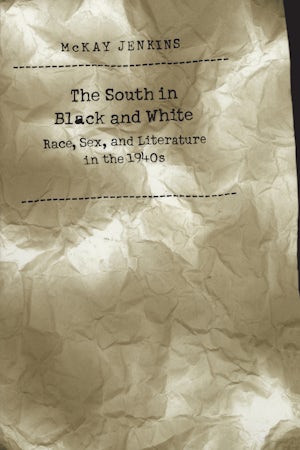The South in Black and White
Race, Sex, and Literature in the 1940s
By McKay Jenkins
232 pp., 6.125 x 9.25, notes, bibl., index
-
Paperback ISBN: 978-0-8078-4777-0
Published: September 1999 -
E-book EPUB ISBN: 978-0-8078-7602-2
Published: October 2005 -
E-book PDF ISBN: 979-8-8908-6970-8
Published: October 2005
Buy this Book
- Paperback $42.50
- E-Book $29.99
Jenkins focuses on four white Southern writers--W. J. Cash, William Alexander Percy, Lillian Smith, and Carson McCullers--to show how they constructed images of race and race relations within works that professed to have little, if anything, to do with race. Sexual isolation further complicated these authors' struggles with issues of identity and repression, he argues, allowing them to occupy a space between the privilege of whiteness and the alienation of blackness. Although their views on race varied tremendously, these Southern writers' uneasy relationship with their own dominant racial group belies the idea that "whiteness" was an unchallenged, monolithic racial identity in the region.
About the Author
McKay Jenkins teaches journalism and American literature at the University of Delaware. He is editor of The Peter Matthiessen Reader and also has written a natural history of avalanches
For more information about McKay Jenkins, visit
the
Author
Page.
Reviews
"An intelligent discussion of the way the subject of race has dominated white southern expression."--The Journal of American History
"[This book] should be bought, discussed, argued about, and taught."--Journal of Southern History
"This thoroughly researched book enters the contemporary literary and cultural discussion in an up-to-date, highly relevant fashion which makes it central to modern studies of race, sex, and culture in Southern literature."--Virginia Quarterly Review
"[An] erudite and thought-provoking book."--Newark Star-Ledger
"Jenkins offers some perceptive analyses. . . . He shows how issues of race are never that far from the surface in American books, and Southern ones in particular."--Times Literary Supplement
"Lillian Smith's arresting analysis of the ways in which the 'drug of whiteness' functioned in the Southern past is brilliantly contextualized in this exciting book. Concentrating on Smith and three other white antiracist writers, Jenkins explores the ways in which they struggled to capture the terrible effects of racism in suppressing awareness of misery among whites, even as they fought and narcotized their own demons by thinking through race."--David R. Roediger, University of Minnesota




